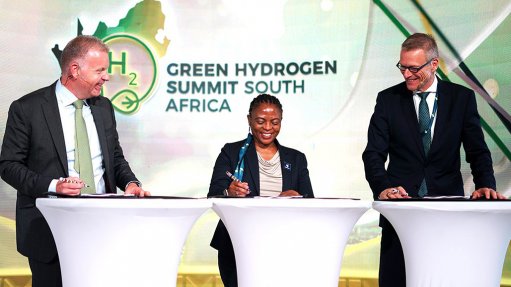
Craig Miller, Priscillah Mabelane and Peter van Binsbergen
Anglo American Platinum, BMW Group South Africa (BMW SA) and Sasol have partnered to prove that a hydrogen mobility ecosystem can operate successfully within South Africa.
The three companies on Monday inked an agreement at the 2023 South African Green Hydrogen Summit in Cape Town that will bring hydrogen fuel cell electric vehicles (FCEVs) and supporting hydrogen refuelling technology to South Africa.
In terms of the agreement, BMW will provide the FCEVs – a test fleet of BMW iX5 Hydrogen cars set to arrive next year – while Sasol will supply the green hydrogen and mobile refueler.
The mobile refueler will transport green hydrogen – hydrogen produced from renewable sources – from the Sasol industrial complex to BMW’s facilities in Gauteng where the vehicles will be refuelled.
With Anglo American Platinum’s platinum group metals (PGMs) already present in the vehicles’ fuel-cell systems, the mining group would provide funding towards the project, said CEO Craig Miller, as part of its effort to drive the global market uptake of PGMs.
Miller noted that PGMs demand would increase by five-million ounces a year if FCEVs capture 10% of the global new-vehicle market, at 100 000 units a year.
BMW SA CEO Peter van Binsbergen explained that the iX5 Hydrogen refuels in three to four minutes, providing 500 km range on its 6 kg tank.
“FCEVs benefit from short refuelling times and long ranges, similar to using a diesel or petrol vehicle, but with the added benefit of zero emissions,” said Miller.
While the battery electric vehicle (BEV), with its generally shorter range, may currently be winning the new-energy-vehicle race, as it was cheaper than a FCEV, Van Binsbergen expected the price gap to start closing significantly by the end of the decade.
FCEVs also required less critical minerals than BEVs, he said, “and I’d rather support the PGMs industry in South Africa”.
China has, to date, secured a significant chunk of the global BEV battery value-chain.
Sasol Energy Business executive VP Priscillah Mabelane said Sasol was currently producing 150 kg of green hydrogen a day, but that this could soon go to 3 t or 4 t a day as the energy group expanded its renewable energy production.
She said Sasol was targeting the electric mobility; chemicals; steel and sustainable fuels sectors with its production of green hydrogen.
“We produced our first batch of green hydrogen at our Sasolburg facility in June, and in 2024 we will ramp this up to commercial scale when a 69 MW wind farm, situated in the Eastern Cape, comes online.”
When asked at what point South Africans could expect to see the first FCEV sold in the domestic market, Van Binsbergen referenced the development timeline for BEVs, noting that the first BMW i3 was on the market in 2013, with BEVs now in production and readily available all over the world.
“As a versatile energy source, hydrogen has a key role to play on the road to climate neutrality,” he added.
“We believe South Africa – with its abundance of raw materials and sound infrastructure base – is ideally placed to deliver on the green hydrogen economy’s promises.”